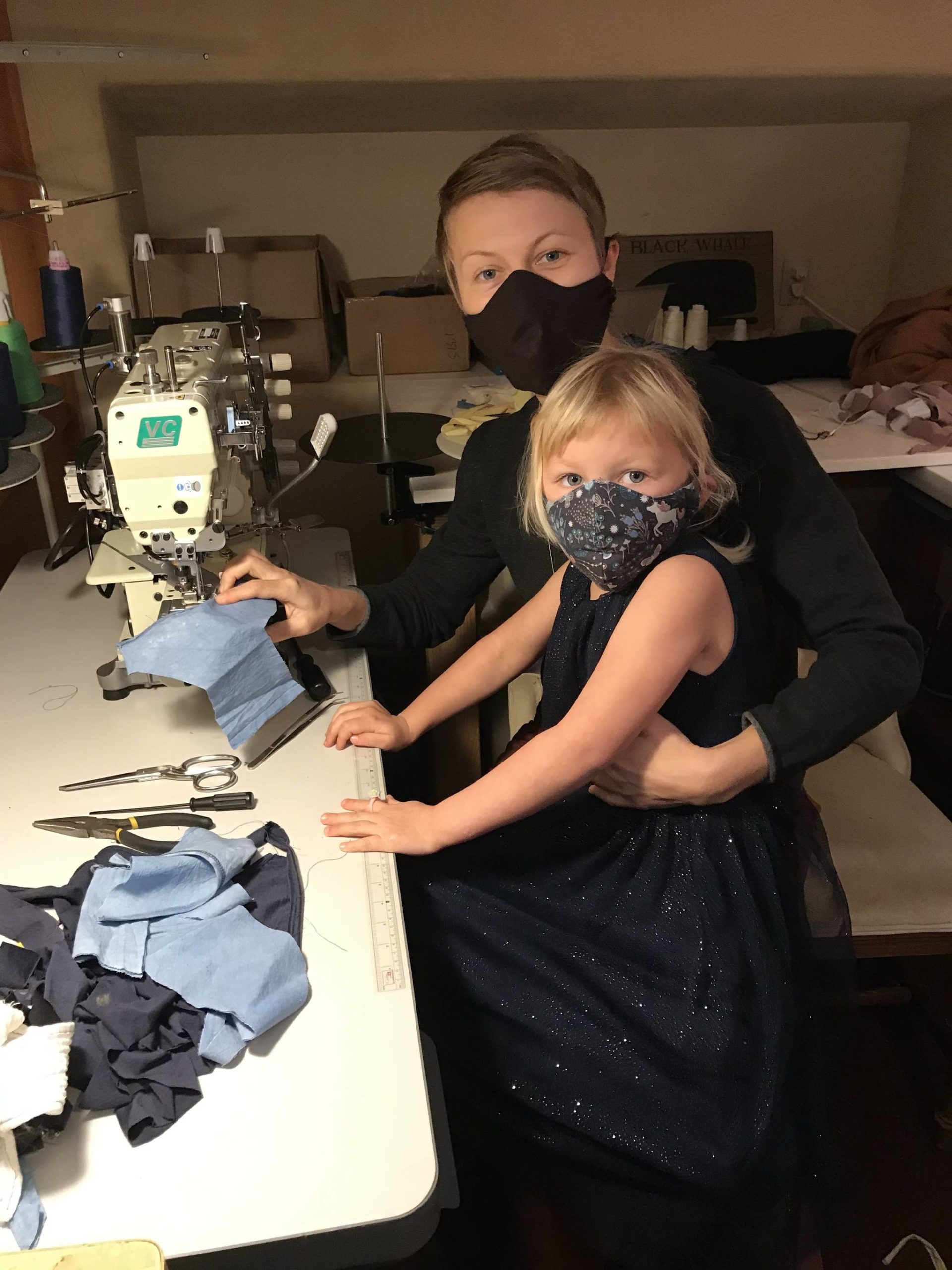You don’t need a mask to keep from catching the virus of San Juan Island’s compassion which motivated San Juan volunteers to create more than 4,500 masks to protect fellow islanders from COVID-19.
“I feel that we are all motivated by the rewarding experience of believing that by making these mask covers for medical providers and essential workers, we are doing something that actually saves lives,” Peace Island Volunteer Krista Mattox said.
Even if you didn’t hear their sewing machines buzzing away at all hours of the day and night, you may have heard of the Masketeers by word of mouth, as stories of their ingenuity and dedication grew. You may not have seen their hands, as teams of sewers, organized to make masks of all different sizes and different fabrics, rushed to fill the need for protective masks but you may have seen their work. The members worked independently, according to Mattox.
“I hadn’t even met most of the Masketeers until I saw them in the recent video my grandson put together,” Mattox said.
The group’s work drew the attention of Mattox’s grandson Max Mattox — a Washington State University student who graduated from Friday Harbor High School in 2019. Max Mattox, who is studying broadcasting production, created a nearly seven-minute YouTube video about the Masketeers titled “Masking San Juan.” Watch his video at youtube.com/watch?v=SDLKJlJftws.
The mask makers began production in March, at the request of PeaceHealth Peace Islands Medical Center Administrator Beth Williams-Geiger. She had contacted the hospital’s nonprofit volunteer program — the Peace Island Volunteers — requesting its help in solving a dilemma facing the facility — a limited number of N95 masks.
“What if we were to have our volunteers sew a mask that can be used protectively over the N95?” Williams-Geiger asked in Max Mattox’s video. “It would allow the caregiver to wear [the N95 mask] all day long.”
Approximately 600 masks were produced within three weeks, Max Mattox claimed in his video. When public health officials began recommending everyone wear cloth masks in April, the group of volunteers felt the need to expand their work. More than 50 additional communities stepped up to the plate, according to Max Mattox.
“Individuals — mostly women, not 100 percent, but mostly women — just stepped up and said ‘This is the right thing to do for our community,’” San Juan County Public Health Officer Dr. Frank James said to Max Mattox. “The women that have provided this to our community literally save lives, literally save a lot of lives. … It’s truly an incredible story of success.”
The Masketeers were born and the group, with the help of the Rainshadow Quilter’s Art Guild, began to sew masks for PIMC patients and the community at large.
“Like the Musketeers, their efforts were helping to protect the community, in this case, from the COVID saboteur,” Max Mattox said in his video.
As the Masketeers grew, they developed an organizational structure that was designed to meet the needs of safety for the volunteers, while at the same time, tapping into the resources of the community, and without exposing the workers unduly to the risk of COVID 19.
“We never could have done this without all of the teamwork that everyone so willingly provided,” Krista Mattox said.
Volunteer Barbara Cable created a spreadsheet to keep track of volunteers, the supplies, and the methods of distribution, Krista Mattox explained, and Peace Island Volunteers’ original eight members were tasked with running the teams of sewers.
Friday Harbor business owners also chipped in to help the Masketeers. David Rand, who owns The Sign Company in Friday Harbor, donated the use of his laser cutting machine to cut out 35,000 mask templates so they could be easily assembled. Verne Howard, who owns Kings Market, donated 400 blue plastic bags so that the sewers could leave their finished masks on their porches every day in the blue bags.
Krista Mattox herself could be seen making her rounds to pick up the blue bags from the porches of the sewers, bring them to her house, which was deemed the project’s unofficial headquarters, and deliver them to PIMC for distribution.
According to Peggy Cregor, who oversees the distribution, the Masketeers are mostly retired women who had prior experience with organization, collaboration, and volunteer spirit.
“Many Masketeers found this to be so rewarding at a time of unrest and uncertainty,” Cregor said. “They were so happy to have something positive to focus their energy on.”
While most of the Masketeers are in their mid-50s, volunteer ages vary, from young mothers to women in their 80s. Cregor noted she feels it has been a good way for those who are wanting to stay socially distant from others but still contribute to the community.
For more information about the Masketeers, or to volunteer your sewing services, email peaceislandvolunteers@rockisland.com.
“We hope in the future to help other organizations with this model we have created to make their organizations work,” Cregor said.
Mandi Johnson contributed to this article.




